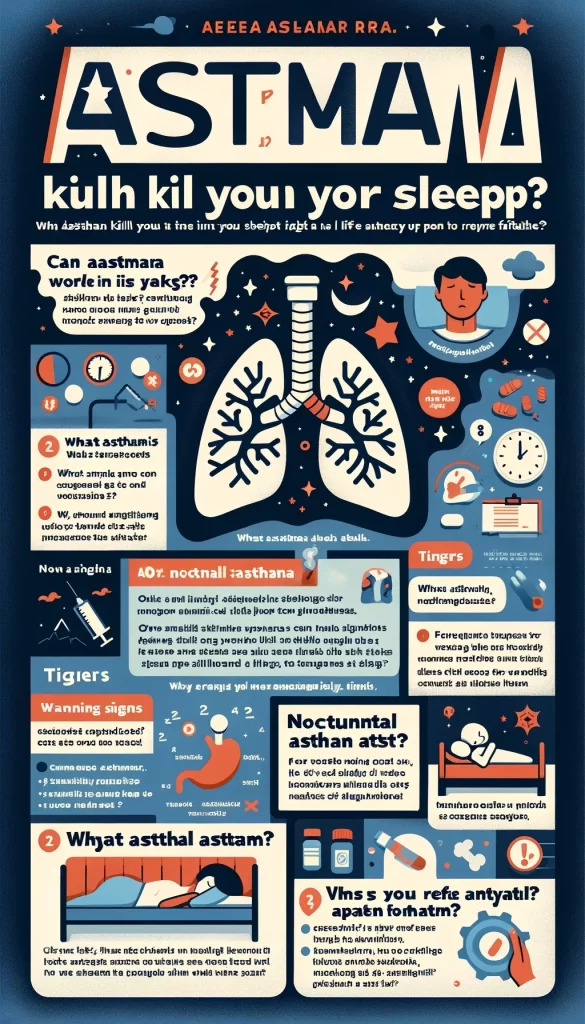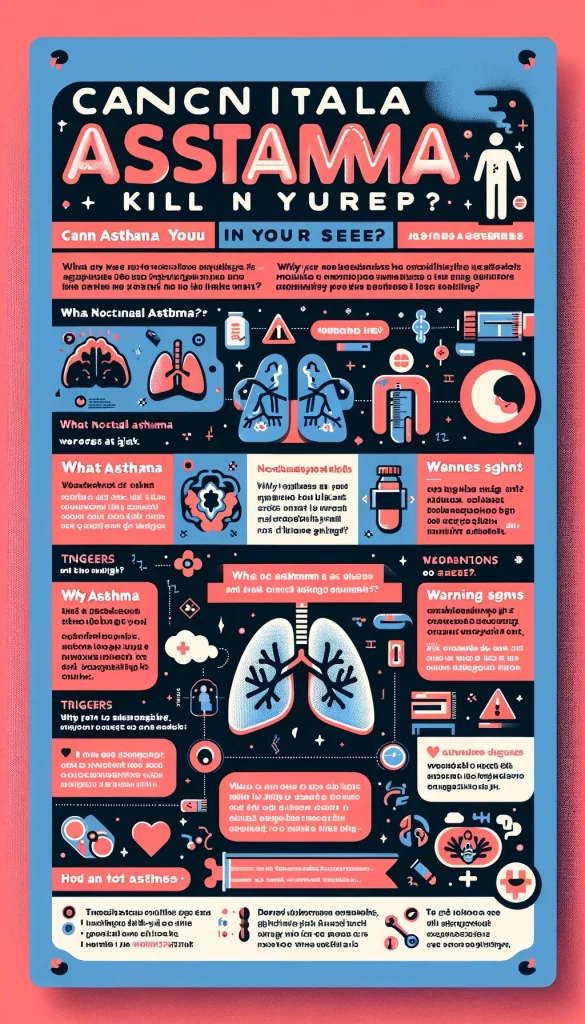Table of Contents
Can asthma kill you in your sleep? Nocturnal asthma symptoms can sometimes worsen and prove fatal if severe attacks during sleep are not treated quickly. Learn about the risks and prevention tips.
Asthma is a chronic lung disease that causes inflammation and narrowing of the bronchial tubes. This makes breathing difficult and can result in coughing, wheezing, chest tightness, and shortness of breath. For many people with asthma, symptoms tend to worsen at night, a condition known as nocturnal asthma. Sleeping itself can also aggravate asthma, as some people experience worsening of their symptoms when lying down. This results in frequent sleep disruptions.
Here is a short answer to your question Can Asthma Kill You in Your Sleep?
Can Asthma Kill You in Your Sleep?

Yes, but it’s rare. Nocturnal asthma symptoms can sometimes worsen and prove fatal if severe asthma attacks during sleep go untreated. Avoiding triggers, controlling asthma, and being prepared to reduce the risk. Most deaths occur in high-risk groups like those with poorly controlled asthma. With proper management, asthma shouldn’t significantly impact life expectancy.
What is Nocturnal Asthma?
Nocturnal asthma, also called nighttime asthma, is a type of asthma where symptoms like wheezing, coughing, and chest tightness get worse between midnight and 8 AM. It affects around 75% of people with asthma.
Several factors can trigger nocturnal asthma attacks:
- Circadian rhythm changes – Hormones like cortisol and epinephrine follow a daily circadian rhythm. Changes in these hormones at night can increase airway inflammation.
- Sleep position – Lying flat can cause airway congestion and worsen symptoms.
- Gastroesophageal reflux disease (GERD) – Acid reflux during sleep can trigger airway spasms.
- Allergens – Dust mites, pet dander, and pollen in the bedroom can cause a delayed allergic reaction.
- Sleep-disordered breathing – Conditions like sleep apnea are associated with severe nocturnal asthma.
Nocturnal asthma often causes poor sleep quality in both adults and children. Frequent loss of sleep can then further worsen asthma control.
Why is Asthma More Dangerous at Night?
Several factors make asthma attacks more severe and potentially life-threatening at night:
1. Delayed Treatment

Symptoms like wheezing and coughing don’t always fully wake someone up from sleep. This delay in waking up means delayed treatment with fast-acting bronchodilators. Even a few minutes delay can be dangerous if asthma is rapidly worsening.
2. Lack of Supervision
For parents of children with asthma, the overnight period means a lack of supervision. Severe asthma attacks can progress quickly in children. If symptoms go unnoticed, urgent treatment may be delayed.
3. Circadian Changes
As mentioned earlier, normal circadian rhythms result in hormonal changes at night that can increase airway inflammation. The body’s natural steroid stress hormone production is also lowest at night. This combination increases the risk of severe attacks occurring in the early morning hours.
4. Comorbidities
Other medical conditions common in asthma like GERD, sinusitis, and obstructive sleep apnea also tend to worsen at night and further compound these risks.
Read also: Baby Rolls Onto Their Stomach While Sleeping But Can’t Roll Back

Warning Signs of a Life-Threatening Attack
Severe asthma attacks require emergency medical treatment. Go to an emergency room right away if you or your child experience:
- Severe shortness of breath that isn’t improved with bronchodilator medication
- Inability to speak full sentences
- Rapid breathing and use of accessory muscles in the neck to breathe
- Blue tinge of the lips or fingernails indicating low oxygen
- Lethargy, confusion or loss of consciousness
Other warning signs that require prompt medical assessment include:
- Wheezing or coughing that persists after initial bronchodilator treatment
- Peak flow meter readings less than 50% of personal best
- Little to no symptom relief from repeated doses of bronchodilator medication
Don’t delay seeking emergency care even if symptoms later improve. A period of severe airway narrowing can cause a lack of oxygen that may have lingering effects.
Can You Die from an Asthma Attack While Sleeping?
Fatal asthma attacks do sometimes occur during sleep, although deaths directly resulting from asthma are relatively rare.
According to the Centers for Disease Control and Prevention (CDC), around 1 in 12 people in the United States have asthma. In 2019, just under 4000 people died from asthma. Most experts believe this is an underestimate of the true number.
While fatal asthma attacks are still uncommon, studies show the majority of deaths from asthma take place during the night or early morning hours.
Reasons why asthma can be fatal include:
- Severe attacks progressing to respiratory failure
- Lack of oxygen and respiratory arrest
- Air leaking out of the lungs into the chest cavity (pneumothorax)
- Stress placed on the heart leading to arrhythmias or heart failure
Having poorly controlled asthma is one of the biggest risk factors for fatal attacks. Uncontrolled asthma leads to more frequent and more severe exacerbations.
Deaths from asthma are most common in:
- African Americans
- People with low socioeconomic status
- Inner city residents
- Those with repeated hospital admissions for asthma attacks
- People with ongoing exposure to triggers like cigarette smoke and air pollution
With proper treatment and avoiding triggers, asthma shouldn’t significantly shorten life expectancy. Still, the risks are greater if asthma is severe and poorly controlled.
Tips to Reduce the Risk of Nighttime Attacks
While some cases of severe asthma are unavoidable, several precautions can help reduce the risks:
Take Control Medications Consistently
Taking prescribed long-term control inhalers for asthma daily is key. Even if you are feeling well, the anti-inflammatory effects help prevent attacks. Common long-term medications include:
- Inhaled corticosteroids
- Long-acting bronchodilators
- Leukotriene modifiers
Don’t stop taking these preventative medications without first consulting your doctor.
Avoid Triggers
Pay attention to triggers that make your asthma worse and take steps to avoid them. Common asthma triggers include:
- Tobacco smoke
- Air pollution
- Cold air
- Respiratory infections
- Exercise
- Allergens like pet dander, pollen, and dust
- Irritants like strong perfumes
Controlling home and bedroom triggers is especially important for reducing nighttime symptoms.
Monitor with Peak Flow Meter
Using a peak flow meter at home helps monitor your asthma control day-to-day. Checking your peak flow first thing in the morning and last thing at night can identify if your asthma is destabilizing and additional medication is needed.
See Your Doctor for Regular Check-ups
Have at least yearly check-ups with your doctor to assess your level of asthma control and if adjustments to your medications are required. Tell your doctor if you are frequently waking at night due to asthma symptoms.
Have an Asthma Action Plan
Work with your doctor to create a written asthma action plan. This tailored plan outlines your daily treatments and what extra medications to take if your asthma flares up. Having an action plan helps ensure you know what to do if symptoms suddenly worsen.
Use Precautions for Exercise
Exercise is an important asthma trigger. Using your inhaled bronchodilator medication 15-30 minutes before physical activity can help prevent exercise-induced attacks. Always stop and rest if symptoms occur.
Creating a Safe Sleep Environment
As asthma often worsens at night, taking precautions to reduce triggers in the bedroom is vital:
- Use allergen-proof bedding encasements to reduce dust mites
- Wash sheets weekly in hot water
- Remove carpets and upholstered furniture
- Use a HEPA air purifier
- Maintain low humidity levels below 50%
- Keep pets out of the bedroom
- Avoid eating big meals close to bedtime if you have reflux
- Sleep with your head slightly elevated if you experience nighttime symptoms
Having emergency medications, water, a phone, and a peak flow meter within reach of the bed is also recommended.
What Should You Do If an Attack Occurs Overnight?
If asthma symptoms worsen during the night:
- Use your fast-acting inhaler (usually albuterol). You can safely take 2-6 puffs every 20 minutes for up to one hour.
- Check your peak flow. If it is below 50% of your personal best, seek urgent medical help.
- Sit upright, take slow breaths, and try to stay calm.
- Turn on a light and leave any potential allergen sources like fans or pets out of the room.
- If symptoms persist or peak flow remains low after an hour, go to an emergency room or call 911.
- Follow your written asthma action plan.
- Notify your doctor about the attack so they can adjust your treatment regime.
Having asthma symptoms frequently disrupt your sleep is a warning sign that your asthma control needs improvement. Speak to an asthma specialist if you regularly wake up due to coughing, wheezing or chest tightness. They can help identify ways to reduce your nighttime symptoms.
Treating Severe Persistent Asthma
For most people, asthma can be well-controlled with avoidance of triggers, and the use of inhaled steroids, and bronchodilators. However, an estimated 5-10% of people with asthma have severe disease that is persistently uncontrolled despite aggressive treatment.
Severe asthma requires high-dose inhaled steroids plus a second daily controller medication to try to prevent exacerbations. Commonly used second agents include:
- Long-acting beta agonists (LABAs) like salmeterol
- Leukotriene modifiers such as montelukast
- Long-acting muscarinic antagonists (LAMAs) like tiotropium
- Biologic therapies (see below)
Despite multiple medications, severe asthma is marked by continued wheezing, shortness of breath, and frequent severe attacks. Nighttime symptoms, exercise-induced asthma, and asthma flares after respiratory infections are also common.
Patients require repeated oral corticosteroid bursts or hospitalizations to treat attacks. These risks mean consulting an asthma specialist is recommended if standard treatments aren’t providing adequate symptom relief.
Biologic Medications for Severe Asthma
In recent years, injectable biologic medications have emerged as a promising new treatment for certain asthma patients. Biologics are genetically engineered proteins designed to block specific immune system pathways involved in asthma inflammation.
Several biologic drugs are now approved as add-on therapy for moderate-to-severe eosinophilic asthma. Eosinophils are a type of white blood cell that promotes airway inflammation in asthma. Common biologics used in asthma include:
- Omalizumab – Targets the antibody IgE
- Mepolizumab and reslizumab – Target the cytokine IL-5
- Benralizumab – Targets the IL-5 receptor
These medications are tailored based on the individual’s immune response and biomarkers like blood eosinophil counts. By targeting the underlying inflammatory process driving asthma symptoms, biologics can substantially reduce asthma attacks and oral steroid requirements for those with refractory disease.
However, biologics come with the downside of being extremely costly, requiring injections, and having rare potential side effects like allergic reactions or increased susceptibility to infections. Not all patients respond, so extensive phenotyping and trials are needed to identify those most likely to benefit.
Emerging Bronchial Thermoplasty Procedure
Bronchial thermoplasty is a new non-drug treatment option for adults with severe persistent asthma. This minimally invasive procedure uses controlled heat energy to reduce excessive airway smooth muscle.
The treatment involves 3 separate bronchoscopy procedures spaced 3 weeks apart. During each visit, a special catheter applies thermal energy to target areas of the airways. This disrupts and thins the bronchial walls, limiting the ability of airways to constrict.
Early research on bronchial thermoplasty is promising. Studies show it can reduce asthma attacks by 32-84% in people with difficult-to-control moderate or severe asthma. The treatment appears safe with no major side effects beyond the temporary worsening of asthma symptoms after the procedure.
However, questions remain about the long-term efficacy and safety of bronchial thermoplasty. The treatment is expensive and not widely available, with only certain specialized centers offering it. More research is needed to clarify what subset of asthma patients are most likely to benefit from this type of airway remodeling approach.

The Future of Asthma Treatment
While there is still no cure for asthma, better treatments continue to emerge. Researchers are investigating novel directions like:
- New biological drugs to target alternative pathways implicated in asthma
- Improved inhaler devices and drug formulations
- Gene therapies to reduce airway inflammation
- Vitamin D supplementation to lessen attacks
- Anti-viral therapies to prevent asthma flares after colds
- Smart inhalers and apps for improved adherence monitoring
- Non-pharmacological approaches like breathing exercises and dietary modifications
Personalized medicine is the future of asthma treatment. The hope is that one day doctors will have the tools to predict exactly what therapies will work for each patient based on their specific immune response and asthma phenotype. Advanced testing may make severe life-threatening asthma a relic of the past.
Final Words – Can Asthma Kill You in Your Sleep?
Asthma is a chronic ailment that can not yet be cured. But for most humans with bronchial asthma, it could be efficiently controlled through fending off triggers, taking manipulated medications as prescribed, and closely tracking symptoms. While middle-of-the-night assaults can be specifically dangerous, the risks from asthma need not prevent you from living an active, healthy life.




